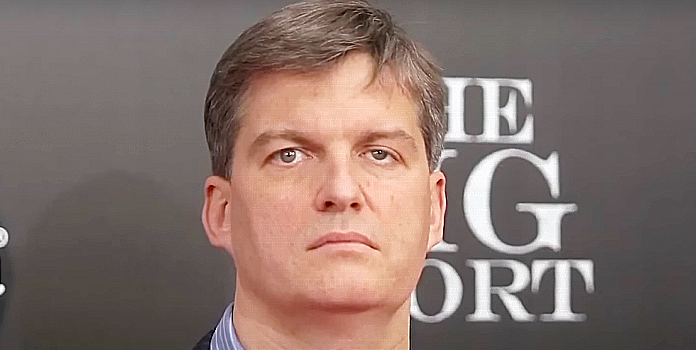(Mark Pellin, Headline USA) The financial asset manager who predicted the 2008 economic implosion indicated this month that he has similar concerns lurking around the corner as the Biden administration’s domestic agenda continues to stumble into deep recession.
Featured in the book and movie The Big Short, Scion Asset Management founder Michael Burry was roundly ridiculed and mocked in 2007 when he predicted a collapse of the housing market, which a year later rocked the world into shellshocked financial crisis with massive taxpayer-bailouts for corporate welfare and the lack of any accountability for globalist elites and corrupt politicians of all stripe.
In what many economists have taken as a bleak warning, Burry has sold all of his firm’s stocks except for one. The purge covered 11 US equities, including Big Tech firms Meta and Alphabet, cutting its holding from $165 million to $3.3 million, Bloomberg reported.
Equally ominous, Scion reported holding no stocks at second quarter’s end except for 500,000 shares of GEO Group — which invests in private prisons and mental health systems.
In a tweet earlier this month, Burry said his concerns revolved around skyrocketing consumer debt running concurrent with continued consumer over-spending.
Despite inflation, Fed rate spikes and international turmoil, the expectation of “free” money from government that started with COVID cash payouts and rent forgiveness has kept consumers shelling out money they don’t have for debt they can’t pay.
“Remember the savings glut problem?” Burry wrote. “No more. COVID helicopter cash taught people to spend again, and it’s addictive.
“Winter coming,” Burry wrote in apparent reference to the HBO series Game of Thrones’ foretelling of doom.
Net consumer credit balances are rising at record rates as consumers choose violence rather than cut back on spending in the face of inflation. Remember the savings glut problem? No more. COVID helicopter cash taught people to spend again, and it’s addictive. Winter coming. pic.twitter.com/fHDnFMCNdD
— michaelburry (@MikeJBurry) August 12, 2022
As evidence backing his outlook, Burry’s tweet included a graph that showed U.S. consumer-borrowing skyrocketed by $40.2 billion in June. That marked the second-biggest increase ever, according to data from the Federal Reserve, reported The Street.
“Net consumer credit balances are rising at record rates as consumers choose violence rather than cut back on spending in the face of inflation,” Burry wrote.
Those sentiments echoed the alarm bell that Burry was ringing in May.
“US Personal Savings fell to 2013 levels, the savings rate to 2008 levels — while revolving credit card debt grew at a record-setting pace back to the pre-COVID peak despite all those $trillions of cash dropped in their laps,” he tweeted, according to Markets Insider. “Looming: a consumer recession and more earnings trouble.”

